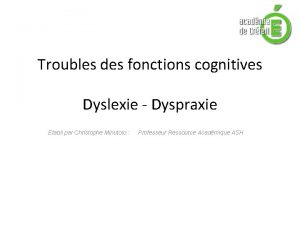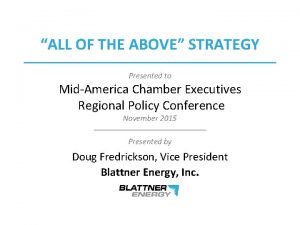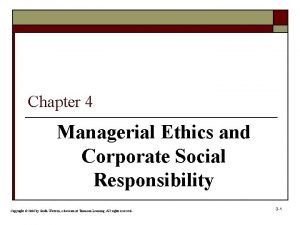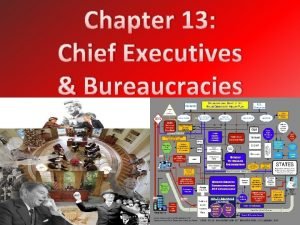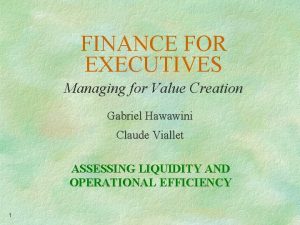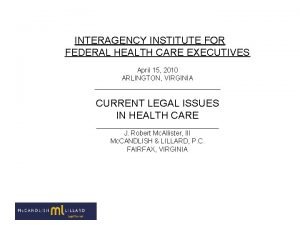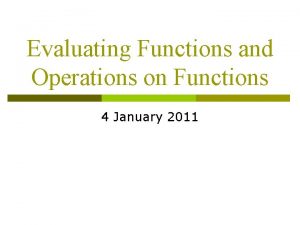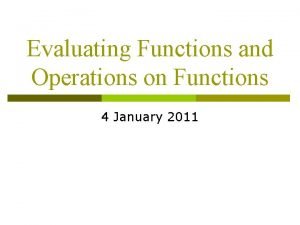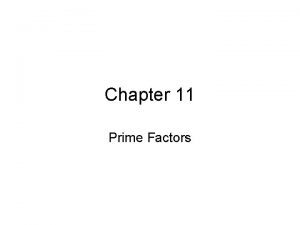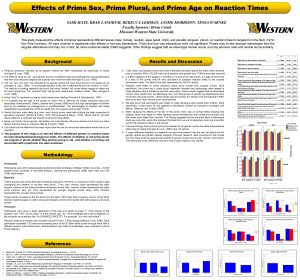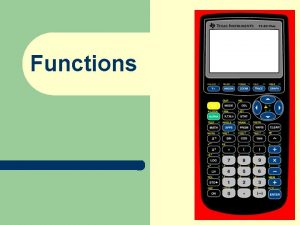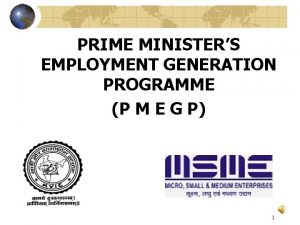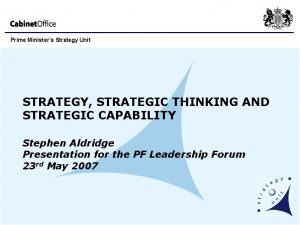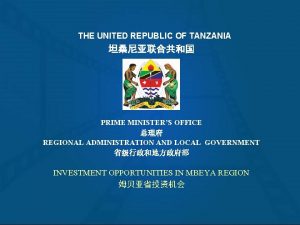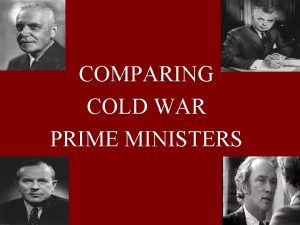Prime Ministers Functions of executives Prime Ministers as














- Slides: 14

Prime Ministers Functions of executives

Prime Ministers (as in UK) Most of the political executives in the modern world can be classified as parliamentary executives. They have three essential forms: 1. The executive leader is head of government while there is a separate head of state. Therefore, in the UK as a constitutional monarchy, we have the Queen. The head of state fulfils ceremonial duties and acts as the focus for patriotic loyalty while the head of government runs the country. 2. The members of political executive are also members of the assembly. As such, there is no separation of the personnel between the legislature and the executive branches of the government. 3. The executive is directly responsible to the assembly and only can survive with the confidence of the assembly.

Prime Ministers • • • Prime ministers are heads of government whose power is derived from their leadership of the majority party, or collation of parties in, in the assembly. Hence why, when David Cameron resigned as Prime Minister there was no public vote – the Conservative Party voted internally to elect a new leader and thus Theresa May became Prime Minister. They have modest powers, the chief of which is the control of patronage - the ability to appoint or sack ministers. “Cabinet reshuffles” will often highlight when a Prime Minister has grown tired or suspicious of a cabinet member. They may be moved to a different department or demoted from the cabinet entirely. * https: //www. theguardian. com/society/2006/may/05/publicservices. localelection s 2006 - Tony Blair cabinet reshuffle article*

Prime Ministers • As the job of prime minister has only a loose constitutional description, the post is really what the holder is able to make of it. They are not elected, but appointed by virtue of their party’s mandate. • Prime ministers need the support of their cabinets (the committee of senior government ministers in charge of government departments) that the Prime Minister chairs and is primus inter pares (first among equals). • However many would argue that recent Prime Ministers – such as Blair and Cameron – have taken a more Presidential approach to their role, seeking and allowing (to an extent) for a variety of opinions to be openly held by their cabinet members. • As such, the power of the prime minister lies in their ability to control their cabinet. • The degree of party unity, the parliamentary strength of the prime minister’s party, and the authority vested in the assembly are important factors in the power a prime minster wields. https: //www. youtube. com/watch? v=kyp. GOTDoi. LI

Circumstances which may effect a PM… • Large majority • Strong credible opposition • Low opinion poll ratings • Supportive media • Recession/economic crisis • Recent election victories • Incompetence • Scandals involving ministers • Unified cabinet • Weak ineffective opposition • Hostile media • Small majority • Divisions within party • Stable economy • High opinion poll ratings • Clear objectives and strategy • Poor handling of crisis

The power of APPOINTMENT (Control of patronage) • The PM has the power to appoint members of the Cabinet. This means that the PM can promote or demote members of the Cabinet in ministerial reshuffles. • This allows the PM to assert his/her authority as loyalty and competence can be rewarded with promotion and the opposite can lead to demotion. • The PM is also responsible for other public appointments such as senior judges, some university posts etc. • For example, after the 2015 election, Theresa May was re-appointed as Home Secretary by David Cameron , a position she had held since 2010. • Following the same election, Sajid Javid was moved from Culture, Media and Sport to the more senior position of Business Secretary (essentially a promotion).

The power of APPOINTMENT (Control of patronage) • The PM’s power of appointment could be claimed to be limited by having ‘powerful’ or ‘influential’ party colleagues or may be limited by a coalition agreement. This means that the PM may be forced to include powerful party figures in the cabinet order to keep them in line. • This is part of ‘collective responsibility’: the idea that while behind closed doors there can be criticism and disagreement of the PM by his own ministers, in public the expectation is that ministers PUBLICLY support the PM and their policies (even if they privately disagree). • Therefore the PM may be ‘forced’ to include certain party colleagues in order to make the government appear more united. This suggests the PM’s authority can be weakened by other individuals. •

The power of APPOINTMENT (Control of patronage) • For example, it is claimed that Tony Blair could not in effect demote Gordon Brown in 2005 (from Chancellor of the Exchequer to a far lesser post such as Deputy Prime Minister) as Brown was popular within the Labour Party membership. • Blair also knew that if Brown was removed then he would have become a significant rival to his leadership. • More recently, David Cameron was severely restricted in his ability to demote any of the Liberal Democrat ministers, such as Vince Cable, despite significant disagreements, as cabinet positions were reserved as part of the coalition agreement 2010 -2015.

CONTROL OF GOVERNMENT BUSINESS • Apart from external events and situations, the PM has the power to set the agenda of the government (what will be discussed at cabinet, which policies will take priority) and this also allows the PM to set up cabinet committees, and appoint their own advisers etc. • The PM can dictate the entire government programme if they so wish – highlighting significant power. • Importantly, in terms national security policy, the PM alone is responsible with no need to discuss with cabinet. Therefore the PM has a lot of power over what the government will do or focus on from an international standpoint. • Despite following collective responsibility at the time, it is known that Tony Blair’s push for the War in Iraq in 2003 was met with disagreement in his cabinet. However, as PM, he had the power to pursue this agenda regardless of his colleagues thoughts.

• However, the PM’s ability to control the governments’ agenda is limited by policy disagreements. • The PM depends on support from their MP’s and ministers to agree with the government position. High profile resignations from cabinet, or leaks, or rumour of discontent can weaken the PM. • In 2016, Iain Duncan Smith (Work and Pensions Sec) very publicly resigned https: //www. youtube. from David Cameron’s cabinet over com/watch? v=_n. AHv. G major disagreements on cuts to ZYkf. Y benefits which he did not agree with and claims he had not been made aware https: //www. theguardia n. com/politics/2016/mar of despite his position. /18/iain-duncan-smith • Cameron responded he was “puzzled” by resigns-from-cabinetover-disability-cuts the resignation.

PARTY LEADERSHIP ROLE The PM gains power from the fact that he/she is leader of their party. The PM is an MP, and the main figure in Parliament, where, usually, they lead the majority party (or biggest single party) and speak on behalf of the government. This gives the PM power as they can usually rely on the support of the majority of MPs in Parliament to support the government. Furthermore, the desire of the majority of the party is to have a strong leader. If a leader is successful and policies are popular with the electorate, then the whole party benefits: In the 1997 election, Tony Blair seen as a strong leader, had wide public support, and Labour won 3 consecutive elections under Blair. Strong leader = good party performance.

LIMITATIONS FROM PARTY LEADERSHIP ROLE However, the PM is limited by party support and leadership challenges. A PM can be undone by their party. It is claimed that PMs are only as powerful as their party allows them to be. The PM must continue to carry the support of MPs as, if a PM loses support, i. e. if the government suffers defeat, then leadership challenges may force a PM out of office Margret Thatcher and Gordon Brown were both felt by many in their own party to have become electoral liabilities Margret Thatcher – 3 time election winner had to resign after she lost support of her cabinet as many MPs thought she would cost them the election Theresa May lost the support of her party over several consecutive Brexit policy defeats and resigned. https: //www. youtube. com/watch? v=vm. Vxclh m. UA 4

UK’s REPRESENTATIVE ABROAD The UK PM also gains power from being seen as a ‘statesman’ in that the PM is seen as the UK’s REPRESENTATIVE ABROAD Although, not head of state (The Queen is), the PM is the principle representative of the country, this puts the PM in a powerful position. The PM attends summit meetings abroad, negotiates with foreign leaders etc. These foreign events can overshadow domestic events and make the PM look strong on the international affairs. https: //www. youtube. com/watc h? v=m. Xh. AZx 1 wil. Y For example, the PM negotiating and interacting with World Leaders at the G 7 Summit in Germany in 2015 such as President Obama and Chancellor Merkel can make him look strong and ‘statesman’ like.

Reading – Role of the PM Complete the reading on the Role of the Prime Minister (pgs 101 -109 from “Democracy in Scotland the UK” posted on the blog) and answer the following questions. 1. Describe what happens to a Prime Minister in a “vote of no confidence”. 2. Outline some of the prerogative powers exercised by the prime minister. 3. Explain the importance of a parliamentary majority for a prime minister. 4. Explain why having high-profile colleagues can be both advantageous and damaging to prime ministerial power. 5. Describe some of the controversies surrounding the power of patronage. 6. Describe, in detail, the terms “primus inter pares” and “collective responsibility”.
 Southeast asian ministers of education organization
Southeast asian ministers of education organization Intinction communion
Intinction communion Building intercultural competence for ministers
Building intercultural competence for ministers Dysgraphie
Dysgraphie Mid america chamber executives
Mid america chamber executives Ongc telephone directory 2016
Ongc telephone directory 2016 Financial executives international canada
Financial executives international canada Managerial ethics and corporate social responsibility
Managerial ethics and corporate social responsibility Protect your executives
Protect your executives Executive departments definition
Executive departments definition Finance for executives: managing for value creation
Finance for executives: managing for value creation Interagency institute for federal health care executives
Interagency institute for federal health care executives Jeff bezos prime video prime
Jeff bezos prime video prime Evaluating functions and operations on functions
Evaluating functions and operations on functions Evaluating functions and operations on functions
Evaluating functions and operations on functions



